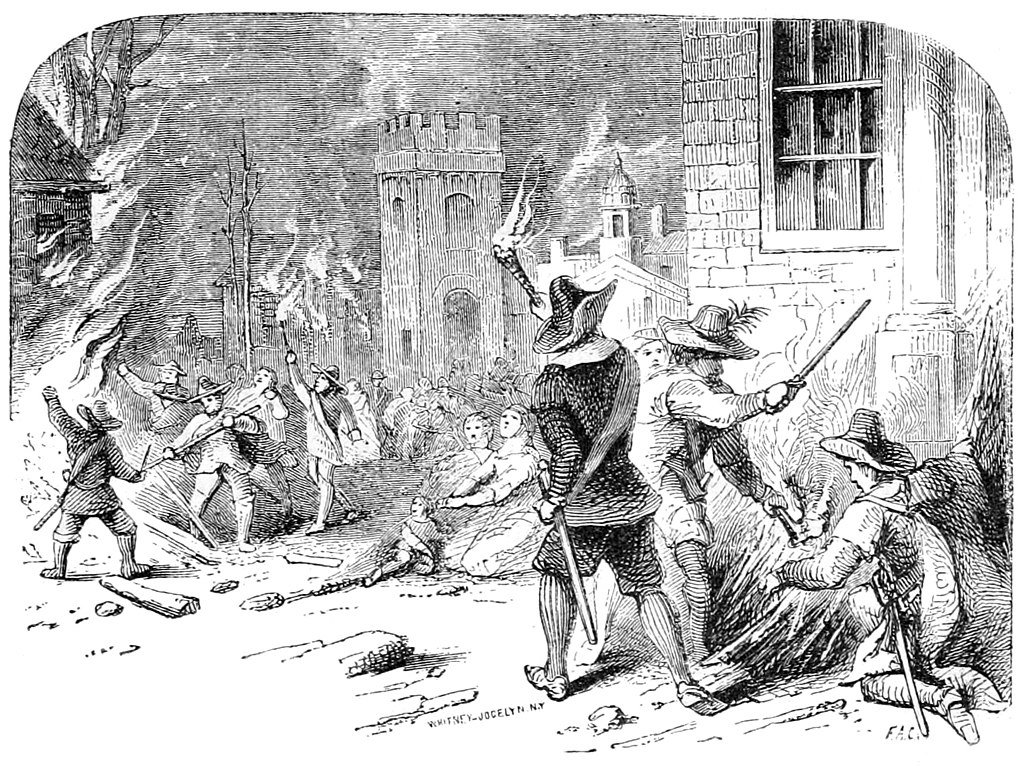Bacon's Rebellion was an armed rebellion launched in Virginia by settlers from 1676-77. It was led by Nathaniel Bacon against Governor William Berkeley. from Here, Madilynn McCarroll looks at the background and reasons for the rebellion.
A depiction of the burning of Jamestown form the 19th century.
Throughout history, many events have defined the USA, such as the Civil War which gave slaves their freedom, or the Boston Tea Party which showed what the new colonists would do for their independence. Without the Civil War, African Americans may still be enslaved. One man can change the course of history whether for the better or the worse. Bacon’s Rebellion holds more weight than people may think, it’s more than a feud between two relatives. It is what defines the colony of Jamestown and what it could have been. Would Jamestown be the colony as we know it to be or would it have been eradicated?
Nathaniel Bacon
Nathaniel Bacon was hot-headed and very full of pride, not willing to conform to the authority that was put in place to keep the colony from going awry. Bacon challenged Governor Berkeley’s power from day one and refused to back down. In Tales from a Revolution, the author discusses the effects that Nathaniel Bacon’s rebellion caused in Virginia and how it caused a rebellion in the state. The author believed that Bacon was 100% in the wrong and that he did nothing but reap chaos and destruction for the colony, and he is the reason for most of the problems they had with Native Americans. Most of the issues and reasons for this rebellion are because of the stubbornness of both Governor Berkeley and Bacon. Nathaniel Bacon earned a quick reputation for himself from the day he stepped foot in Jamestown and became known as“very ambitious and arrogant.” (rice 2012, pg.28) So, it was no surprise that Bacon did exactly what he wanted instead of submitting to Governor Berkeley.
The main reason for the rebellion was an argument between Berkeley and Bacon about the colonists and Native Americans. This was the beginning of Bacon's Rebellion because this small argument would lead the way to bitterness and anger between the two relatives. The Native Americans in the area were stealing from the colonists and Berkeley decided to wait it out and hoped that they wouldn’t do it again. This infuriated Bacon and he completely disagreed with the Governor’s approach to the matter. Bacon decided to serve his own justice on the Native Americans but ended up crushing the peace that Governor Berkeley had tried to have with them.
Nathaniel Bacon also led a very diverse group of people and some were even former slaves. Bacon granted these indentured servants their freedom if they agreed to become a part of his rebellion. Many scholars believe this justifies Bacon’s Rebellion because of the freedom he gave the slaves, but in reality, it endangered their lives. They were no longer innocent as they were enemies of the state of Virginia. In the end, Governor Berkeley pleaded with Bacon’s followers and offered them redemption and mercy if they turned themselves in. He promised not to harm them just like Bacon did with the indentured slaves.
Impact
Since the Rebellion many things have changed and shaped American history. According to this article scholars believe that the Rebellion is a mix of “fundamental restructuring, of patterns of war, exchange, society, and diplomacy throughout eastern North America.” (Rice 2014, pg.4) We have learned to deal with war and changes in society because of this and it has taught Governors since Berkeley ways to avoid and overcome similar problems that were created by Bacon. Nathaniel Bacon didn’t agree with Berkeley’s decision because he believed that it would lead to the destruction of Jamestown and that the Native Americans would take advantage of the colony. I believe that Nathaniel Bacon was in the wrong and his Rebellion was treason. His actions were based on pride and arrogance which led to a massacre of innocent Native Americans. Although he promised slaves their freedom he led them to their graves instead. Governor Berkeley however should have done more to prevent such chaos and he should have done his duty as Governor and protector of Jamestown. If Nathaniel Bacon didn’t stand up against the Native Americans in the way that he did, Jamestown could have suffered greatly. People looked to Bacon as a protector, for example the people of Henrico County knew that he was an outlaw but agreed that he would do everything to defend them. Governor Berkeley eventually got the last say and ended the Rebellion and gained back his power as Governor of Virginia. I may not have agreed with Berkeley at the beginning but by the end the Governor was right and Nathaniel Bacon got what he deserved as a rebel of the state of Virginia.
What do you think of Bacon’s Rebellion? Let us know below.
Bibliography
Oxford African American Studies Center and Bradford J. Wood. 2006. “Virginia.” (December). https://oxfordaasc-com.ezproxy.liberty.edu/view/10.1093/acref/9780195301731.001.0001/acref-9780195301731-e-45086?rskey=VRqNxm&result=4.
rice, James d. 2012. Tales from a Revolution: Bacon's Rebellion and the Transformation of Early America. 1st ed. N.p.: Oxford University Press, Incorporated. https://ebookcentral-proquest-com.ezproxy.liberty.edu/lib/liberty/reader.action?docID=4704490.
Rice, James D. 2014. “The Journal of American History.” Bacon's Rebellion in Indian Country 101 (December). https://www-jstor-org.ezproxy.liberty.edu/stable/44286295?pq-origsite=summon&seq=1#metadata_info_tab_contents.







